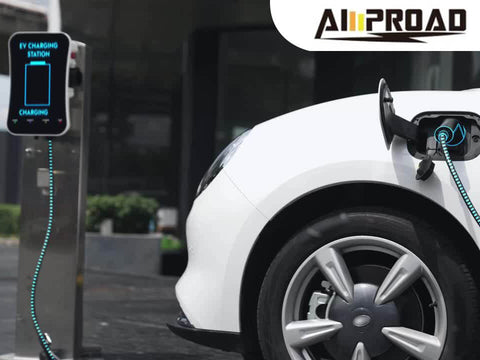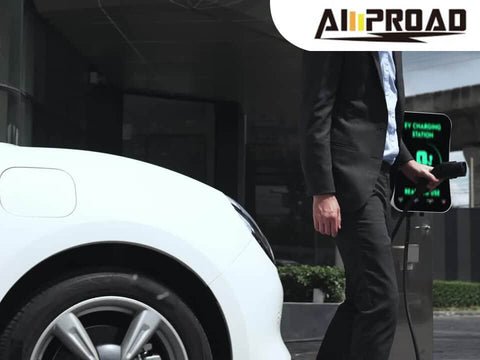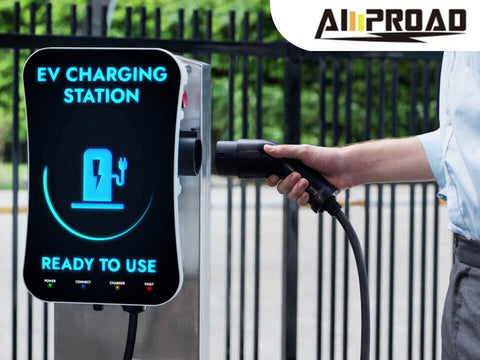How Do You Know if a Level 2 EV Charger Is Compatible with Your Electric Vehicle?
Feb 26, 2024

Ensuring compatibility between your electric vehicle (EV) and a Level 2 EV charger is crucial for seamless charging experiences. Compatibility ensures that the charger's specifications align with your vehicle's charging requirements, including voltage, amperage, and connector type. Incompatible chargers may not deliver the necessary power or may not physically connect to your vehicle, resulting in inefficient charging or the inability to charge altogether. Therefore, understanding compatibility factors is essential to optimize charging efficiency and prevent potential issues during the charging process.
Level 2 EV chargers offer faster charging speeds compared to standard Level 1 chargers, making them a preferred choice for many EV owners. These chargers typically use a 240-volt electrical circuit, allowing for quicker charging times and greater convenience. Additionally, Level 2 chargers come in various amperage ratings, providing flexibility to accommodate different EV models and charging needs. By familiarizing yourself with the specifications of both your EV and the Level 2 charger, you can ensure compatibility and enjoy efficient and reliable charging experiences.
How can you determine if a Level 2 EV charger is compatible with your electric vehicle?
How can you determine if a Level 2 EV charger is compatible with your electric vehicle? Firstly, understanding connector types and charging standards is crucial. Different electric vehicles use various connector types, such as J1772, Type 1, or Type 2, depending on the region and manufacturer. Additionally, certain charging standards like CCS (Combined Charging System) or CHAdeMO may be supported by specific EV models. Researching these connector types and charging standards will help you identify compatible chargers for your electric vehicle.
Secondly, checking your electric vehicle's specifications and requirements is essential. Review your EV's manual or documentation to find information about its onboard charger, voltage, and current requirements. This includes understanding the maximum charging capacity supported by your vehicle and whether it can accept Level 2 charging. By comparing your electric vehicle's specifications with the specifications of potential Level 2 chargers, you can ensure compatibility and optimal charging performance.
In a word, determining if a Level 2 EV charger is compatible with your electric vehicle requires understanding connector types, charging standards, and your vehicle's specifications. By researching these factors and comparing them with the charger's specifications, you can confidently select a charger that meets your EV's charging needs.
What factors should you consider when assessing compatibility between your EV and a Level 2 charger?
When assessing compatibility between your electric vehicle (EV) and a Level 2 EV charger, several factors should be considered. Firstly, it's essential to examine the voltage and current ratings of the charger. Level 2 EV chargers typically operate at higher voltages (such as 240 volts) and offer various current ratings (e.g., 16 amps, 32 amps, or 40 amps). Ensuring that the charger's voltage and current ratings align with your EV's specifications is crucial for safe and efficient charging.
Additionally, compatibility with your electric vehicle's onboard charger is paramount. The onboard charger in your EV determines how quickly it can accept a charge from an external source. Some EVs have onboard chargers capable of handling higher charging rates, while others may be limited to lower rates. It's essential to verify that the Level 2 charger you're considering is compatible with your EV's onboard charger to avoid any charging issues or potential damage to the vehicle's electrical system.
Moreover, other considerations such as connector types, charging standards, and communication protocols may also influence compatibility between your EV and a Level 2 charger. Connector types like J1772 or Type 2, as well as charging standards like CCS or CHAdeMO, should be compatible with your EV's charging port. Additionally, ensuring compatibility with communication protocols such as ISO 15118 for smart charging functionalities can enhance the overall charging experience. By carefully evaluating these factors, you can select a Level 2 EV charger that seamlessly integrates with your electric vehicle and meets your charging needs.
When considering compatibility between your electric vehicle (EV) and a Level 2 EV charger, the Amproad EV charger stands out as a reliable option. With its adaptive voltage range of 90-250 volts and adjustable amperage settings ranging from 10 to 40 amps, the Amproad charger offers versatility to suit various EV models and charging requirements. Its compatibility with both Level 1 and Level 2 charging ensures seamless integration with your EV's onboard charger, while its high-quality construction and safety features provide peace of mind during charging sessions. Additionally, Amproad's reputation for reliability and customer satisfaction makes it a recommended choice for EV owners seeking a compatible and efficient charging solution.

Are there specific connector types or charging standards you should look for when choosing a Level 2 charger?
When selecting a Level 2 charger for your electric vehicle (EV), it's essential to consider specific connector types and charging standards to ensure compatibility. Common connector types include J1772 and Type 2, each with its respective plug design. The SAE J1772 connector is widely used in North America, while the Type 2 connector is prevalent in Europe and other regions. Understanding which connector type your EV uses is crucial when choosing a Level 2 charger to ensure a proper fit and secure connection during charging sessions.
Additionally, familiarizing yourself with charging standards like CCS (Combined Charging System) and CHAdeMO can further aid in selecting the right Level 2 charger. CCS and CHAdeMO are fast charging standards commonly used for DC fast charging, allowing for quicker charging times compared to Level 2 charging. While Level 2 chargers typically adhere to the AC charging standard, knowing about these fast charging standards can provide insight into the broader EV charging landscape and potential future charging needs.
Ultimately, when considering connector types and charging standards for a Level 2 charger, it's essential to prioritize compatibility with your EV's specifications. Ensuring that the charger's connector type and charging standard align with your EV's requirements will facilitate seamless and efficient charging experiences. By understanding these factors and selecting a Level 2 charger that meets your EV's needs, you can enjoy convenient and reliable charging at home or on the go.
Can you use an adapter to make a Level 2 charger compatible with your EV if they have different plug types?
If you find yourself with a Level 2 charger that has a different plug type than your electric vehicle (EV), using an adapter may seem like a solution to achieve compatibility. However, it's crucial to assess the feasibility and safety of such an approach before proceeding. While adapters can technically allow you to connect a Level 2 charger with a different plug type to your EV, there are potential risks and limitations to consider. Adapting plug types may not always guarantee a secure and reliable connection, potentially leading to safety hazards or damage to the charger or vehicle.
Furthermore, when considering adapters, it's essential to be aware of any potential limitations or compatibility issues that may arise. For example, some EV manufacturers may not recommend or support the use of adapters with their vehicles, citing safety concerns or warranty implications. Additionally, adapters may introduce additional points of failure or inefficiencies into the charging process, affecting charging speed or reliability. While adapters can provide a temporary solution in certain situations, they may not offer a long-term, reliable charging solution, especially if your EV relies on proprietary charging infrastructure like the Tesla destination charger.

What are the consequences of using an incompatible charger with your electric vehicle?
Using an incompatible charger with your electric vehicle (EV) can have various consequences that may affect both the vehicle and the charging process. One significant risk is the potential for damage to the vehicle's battery or charging system. Incompatible chargers may deliver power in ways that the vehicle's system is not designed to handle, leading to overcharging, overheating, or other forms of electrical stress. This can result in accelerated battery degradation or even permanent damage to the battery pack or charging components, potentially necessitating costly repairs or replacements.
In addition to the risk of damage, using an incompatible charger can also impact the charging speed, efficiency, and safety of the charging process. Different chargers may operate at varying voltages, currents, or charging protocols, which can affect the overall charging performance. Incompatible chargers may result in slower charging speeds, reduced efficiency, or inconsistent charging behavior, leading to longer charging times or unreliable charging sessions. Moreover, using an incompatible charger may compromise safety by increasing the likelihood of electrical faults, overheating, or other charging-related hazards, posing risks to both the vehicle and its surroundings.
To mitigate these consequences, it's essential to ensure that you use a charger that is compatible with your specific EV model and charging requirements. This involves verifying compatibility based on factors such as connector types, charging standards, voltage and current ratings, and manufacturer recommendations. By using a compatible charger, you can help safeguard your vehicle's battery and charging system, optimize charging performance, and promote safe and efficient charging experiences.
Are there any resources or tools available to help you find a compatible Level 2 charger for your EV?
Finding a compatible Level 2 EV charger for your electric vehicle (EV) can be facilitated by various resources and tools available online and through EV-related communities. Many charger manufacturers offer online compatibility checkers on their websites, allowing users to input their EV make and model to determine which chargers are compatible. These tools often provide detailed information about charger specifications, connector types, and charging standards, helping users make informed decisions about charger compatibility. Additionally, consulting electric vehicle forums, websites, or dealership resources can be valuable in gathering insights and recommendations from experienced EV owners or professionals. These platforms may offer user-generated reviews, compatibility guidelines, or discussions on charger compatibility, providing valuable insights and guidance in selecting the right charger for your EV.
Furthermore, some EV manufacturers or dealerships may offer assistance in identifying compatible chargers for their vehicles. Dealership representatives or customer service personnel may be able to provide recommendations or guidance based on your specific EV model and charging requirements. Additionally, EV enthusiast communities and online forums are excellent resources for seeking advice and recommendations from fellow EV owners who may have firsthand experience with different chargers and compatibility issues. By leveraging these resources and tools, EV owners can streamline the process of finding a compatible Level 2 EV charger near me, ensuring a seamless and reliable charging experience.
How do you ensure that the electrical circuitry in your home can support the installation of a Level 2 charger?
Before installing a Level 2 charger at home, it's crucial to ensure that your electrical circuitry can support the additional load. Start by evaluating the capacity of your home's electrical panel to determine if it can handle the charging requirements of a Level 2 charger. The electrical panel's amperage rating should be sufficient to accommodate the charger's power demand without overloading the circuit. If your electrical panel has sufficient capacity, you can proceed with the installation. However, if it's inadequate, you may need to upgrade your electrical panel to support the charger's power requirements.
To assess your home's electrical capacity accurately, it's advisable to consult with a qualified electrician. A professional electrician can conduct a thorough home electrical assessment to determine if your electrical system meets the necessary requirements for installing a Level 2 charger. They can also provide recommendations for any necessary upgrades or modifications to ensure safe and efficient charging operations. By consulting with a qualified electrician, you can ensure that your home's electrical circuitry is properly configured to support the installation of a Level 2 EV charger, minimizing the risk of electrical issues or safety hazards.
What should you do if you're unsure about the compatibility of a Level 2 charger with your electric vehicle?
If you're uncertain about the compatibility of a Level 2 charger with your electric vehicle, there are several steps you can take to gain clarity. First, consider reaching out to the charger manufacturer or your electric vehicle dealership for guidance. These experts can provide valuable insights into the compatibility of specific chargers with your vehicle model. They may also offer recommendations or alternatives to ensure a seamless charging experience. Additionally, seeking advice from EV charging experts or online communities can be beneficial. These forums often feature discussions and advice from experienced EV owners and enthusiasts who can share their firsthand experiences and recommendations regarding charger compatibility issues.
One option to explore is the fastest home EV charger available in the market. These chargers are designed to deliver higher charging speeds, allowing you to charge your electric vehicle more quickly and efficiently. By investing in a fastest home EV charger, you can reduce charging time and enjoy greater convenience when powering up your electric vehicle at home. However, it's essential to verify compatibility with your specific electric vehicle model before making a purchase to ensure optimal performance and compatibility.
If you're still unsure about the compatibility of a Level 2 charger with your electric vehicle, consider consulting with a qualified electrician. An electrician can assess your vehicle's charging requirements and recommend suitable charging solutions based on your needs. They can also provide guidance on installation requirements and ensure that the charger is safely integrated into your home's electrical system. By seeking professional advice and assistance, you can make informed decisions about choosing the right charger for your electric vehicle and enjoy reliable charging performance for years to come.
Are there any aftermarket modifications or upgrades available to make your EV compatible with a wider range of Level 2 chargers?
If you're seeking to expand the compatibility of your electric vehicle (EV) with a wider range of Level 2 chargers, aftermarket modifications or upgrades may offer potential solutions. One option to consider is adapter kits designed to bridge the gap between different plug types or charging standards. These kits may enable you to connect your EV to chargers with varying connector types, enhancing flexibility and convenience. Additionally, retrofitting options may be available to modify your vehicle's charging port or electrical system to accommodate different charger specifications. However, it's crucial to research these aftermarket solutions thoroughly and ensure they meet safety standards and regulatory requirements to avoid potential risks or complications.
Before pursuing aftermarket modifications or upgrades for your EV, it's essential to consider the potential implications on your vehicle warranty and safety certifications. Making unauthorized modifications to your EV's charging system could void manufacturer warranties or compromise safety certifications, leading to potential liabilities or issues down the line. Therefore, it's advisable to consult with your vehicle manufacturer or authorized dealerships to understand the impact of any aftermarket modifications on your warranty coverage and safety assurances. By weighing the pros and cons and seeking expert advice, you can make informed decisions about aftermarket solutions to enhance the compatibility of your EV with Level 2 chargers while mitigating risks and ensuring compliance with industry standards.
Can you use a Level 2 charger designed for a specific EV brand with other electric vehicle models?
Using a Level 2 charger designed for a specific electric vehicle (EV) brand with other EV models entails certain limitations and risks that users should be aware of. While some Level 2 chargers may be compatible with multiple EV brands, it's essential to understand that certain chargers may have proprietary features or connectors tailored specifically for a particular vehicle manufacturer. Attempting to use a charger designed exclusively for one brand with a different EV model may result in compatibility issues, such as incompatible plug types or charging protocols, potentially leading to charging failures or safety hazards. Therefore, it's crucial for users to verify the compatibility of a Level 2 charger with their specific EV model before attempting to use it to avoid potential risks or complications.
For users seeking more universal charging solutions, exploring options such as universal chargers or adapters may offer potential solutions to overcome compatibility challenges. Universal chargers are designed to accommodate a wider range of EV models by supporting common charging standards and connector types, providing greater flexibility and versatility for users with different EV brands. Additionally, adapters designed to bridge the gap between different plug types or charging standards can help users connect their EVs to chargers that may not be directly compatible with their vehicles, expanding charging options and convenience. However, it's important to exercise caution when using adapters and ensure they meet safety standards and regulatory requirements to avoid potential risks or damages to the EV or charging infrastructure. By exploring universal chargers or adapters as potential solutions, users can enhance the compatibility of their EVs with Level 2 chargers and maximize charging convenience while minimizing risks.



